Boris Johnson resignation: Did he meet his pledges as prime minister?
- Published
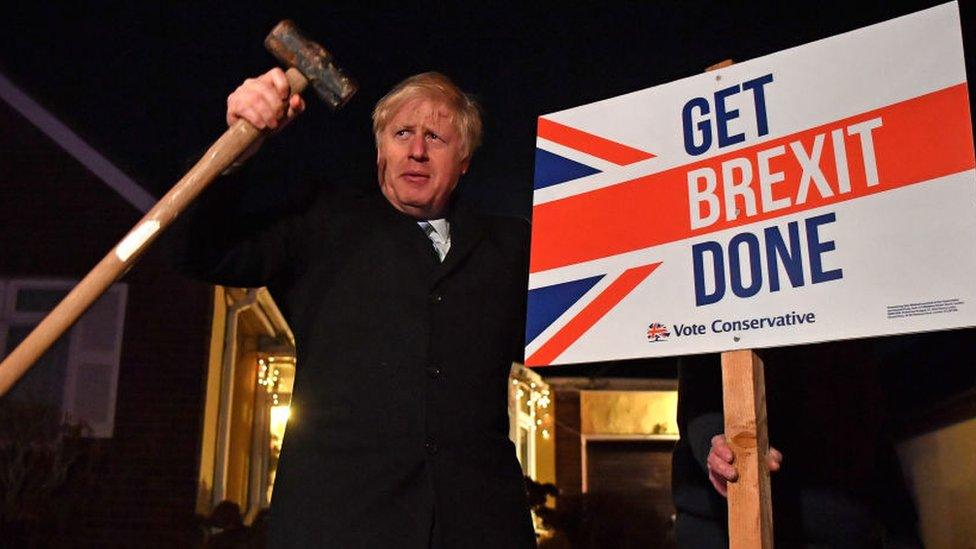
"Get Brexit done" was the central theme of the Conservatives' 2019 manifesto.
During his last week in office, Boris Johnson talked about his record in government - highlighting policies on police recruitment and broadband.
He became prime minister and won a landslide victory in 2019 and made a series of pledges to voters. Delivering on them was made harder by the Covid pandemic, but how did he get on?
Pledge: 20,000 more police
The Conservatives promised this for England and Wales by March 2023.
Latest figures, external, up to 30 June 2022, show an extra 13,790 police officers recruited. That means the government is two-thirds of the way there with one year to go.
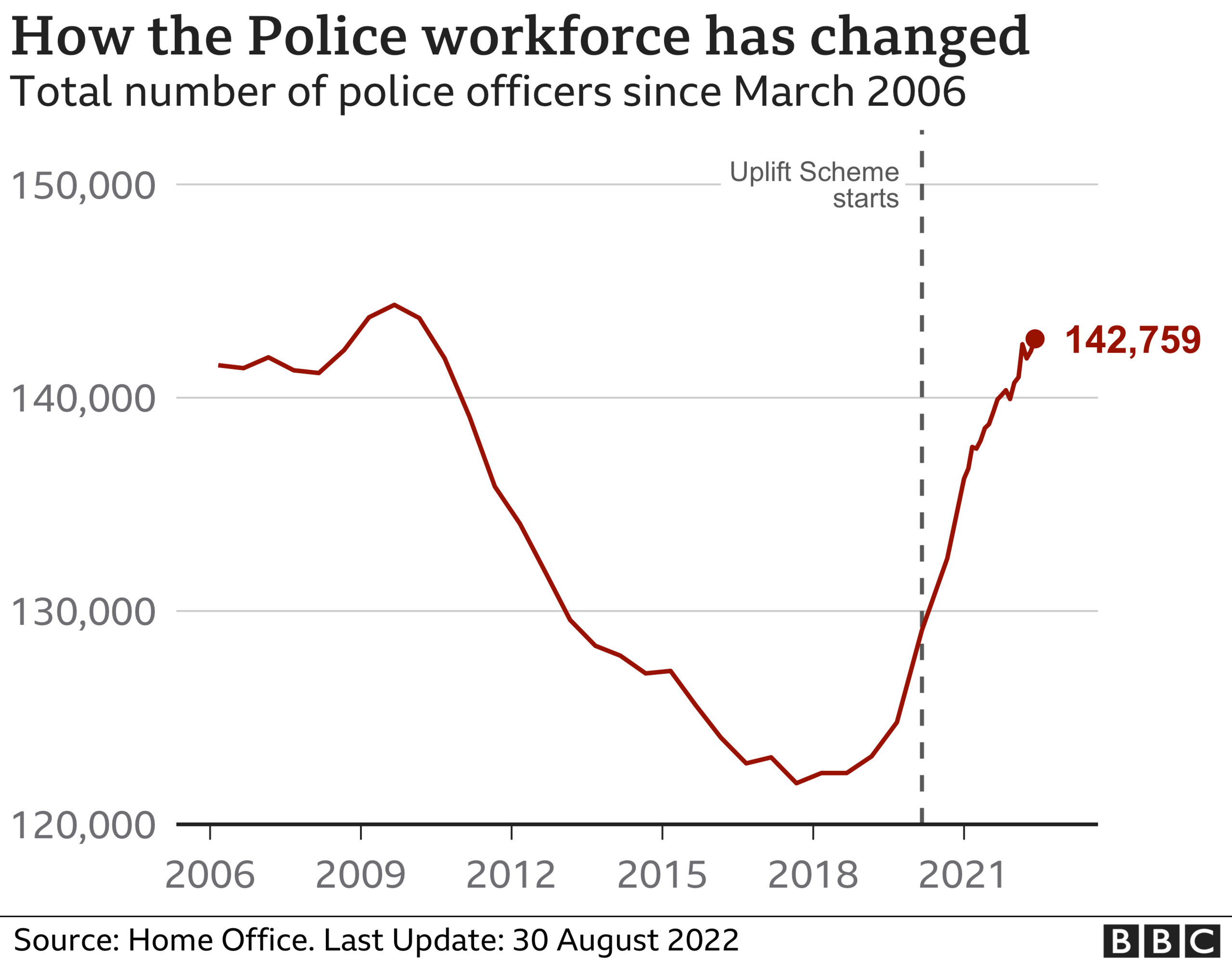
But that rise still hasn't made up for police numbers falling by 20,545 between March 2010 and March 2019, external - under Conservative-led governments.
Pledge: 50,000 more nurses and 6,000 more GPs
The Conservatives promised this for England by March 2025.
Latest figures, external show 319,846 full-time equivalent NHS nurses and health visitors in May 2022. That is up 23,753 since December 2019, leaving 26,247 posts to fill.

On GPs, there were 35,257 full-time equivalents in post in July 2022, external. That's up by just 738 since the end of December 2019, external.
If you exclude locums (doctors who temporarily fill a rota gap) and trainees, GP numbers have actually decreased by 314 since December 2019.
In November 2021, the then Health Secretary Sajid Javid said: "I'm not going to pretend we're on track when we're not."
Pledge: Build 40 new hospitals
This 2019 pledge was to be met "over the next 10 years".
In August 2021, the government came up with several definitions for what it said constituted a "new" hospital:
A whole new hospital on a new site or current NHS land
A major new clinical building on an existing site or a new wing of an existing hospital
A major refurbishment and alteration of all but building frame or main structure
In December 2021, analysis by BBC Reality Check , found that of the 40 hospital projects announced by the government:
22 were rebuilding projects
12 were new wings within existing hospitals
three involved rebuilding non-urgent care hospitals
three were entirely new hospitals
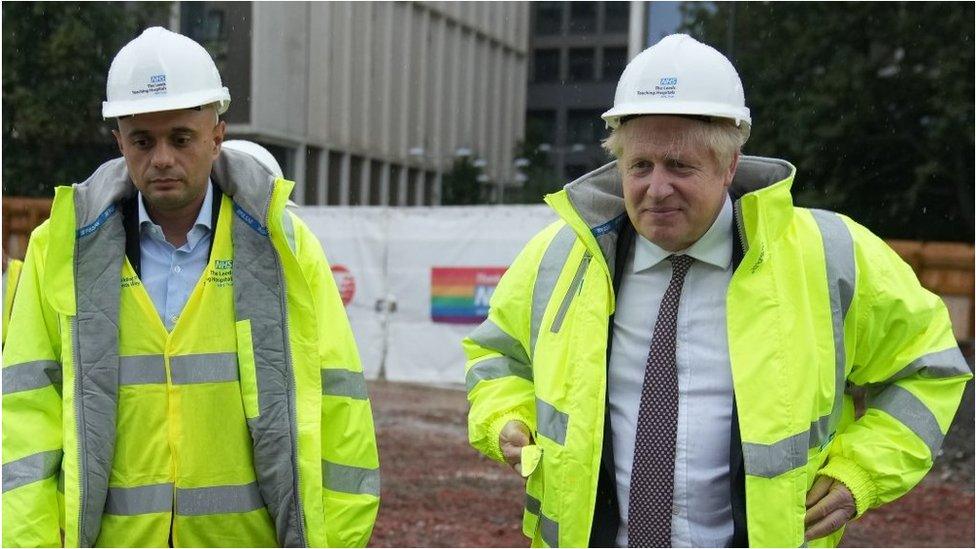
When asked for an update, on 7 June 2022, a Department of Health spokesperson told us that one of the 40 hospitals "opened for patients last year and a further six are in construction".
Pledge: 300,000 homes a year
This manifesto pledge was to be met by "the mid-2020s".
In 2019-20, there were 242,700 net additional dwellings, which fell to 216,490 in 2020-21.
Net additional dwellings includes houses converted to flats, commercial buildings switching to domestic use, as well as new builds. It also factors in demolished houses.
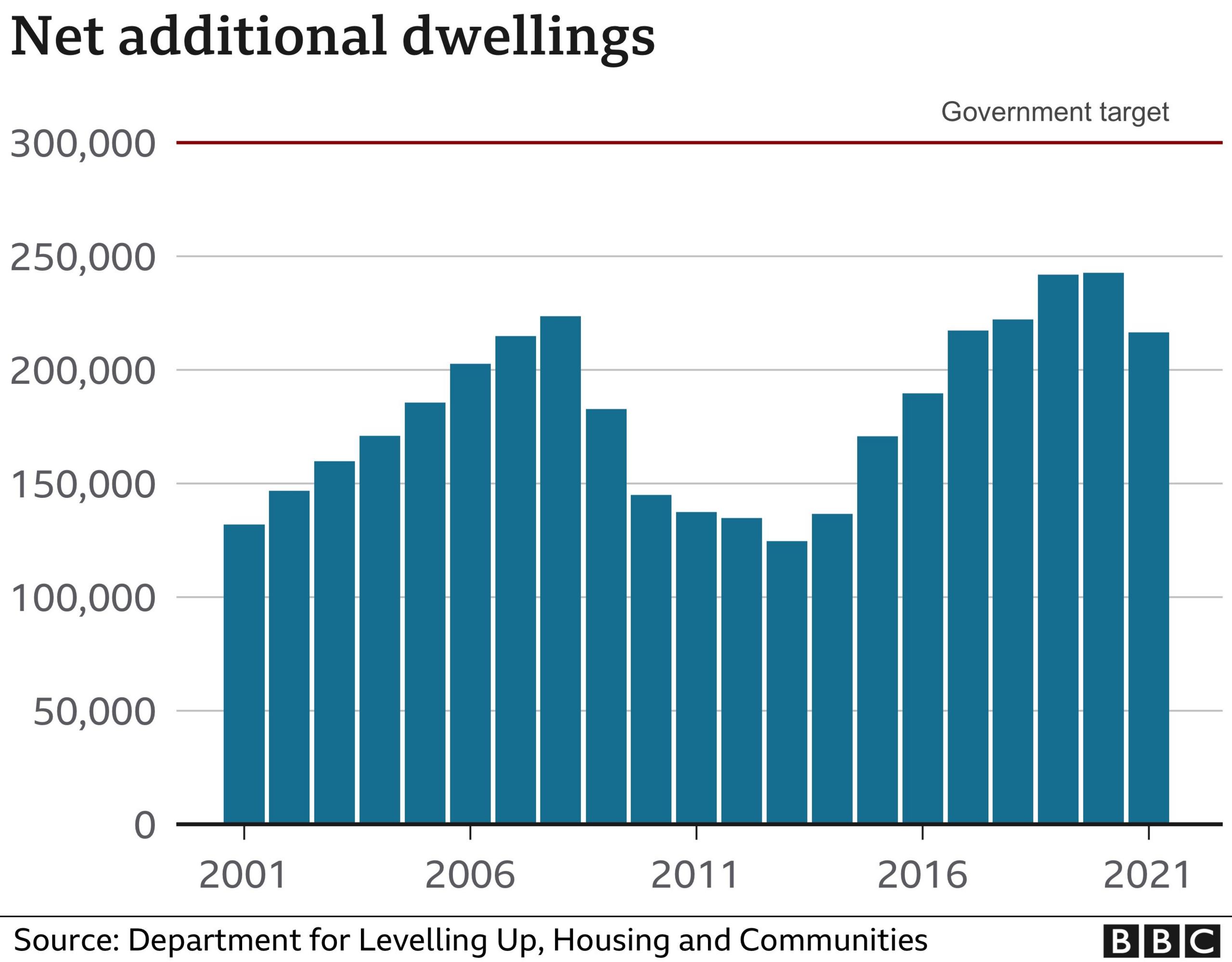
The prime minister was asked about the pledge on 9 June 2022 and said: "I can't give you a cast iron guarantee that we're going to get to a number in a particular year."
Pledge: Get Brexit done
This was achieved in a literal sense as the UK left the EU on 31 January 2020.
Britain departed from the EU's single market and customs union 11 months later, after agreeing a basic free trade deal with the EU.
But if this election slogan implied Brexit would be done and dusted, this has clearly not happened. A huge amount remains unresolved, from Northern Ireland to financial services.
A large number of trade deals have been signed around the world (most to replace the ones the UK already had as an EU member) but a deal with the US hasn't happened.
The Office for Budget Responsibility (OBR), which makes economic judgements for the government, predicts, external that leaving the EU will reduce the UK's imports and exports by about 15% in the long term, with about a 4% hit to productivity.
Supporters of Brexit say sovereignty has been restored, and unwanted regulations can now be cut.
Pledge: Australian-style points-based immigration system
This was not possible while the UK was in the EU because of rules giving citizens the freedom to live and work in all EU countries.
After Brexit, the government did launch this system. EU citizens wishing to live and work in the UK now have to apply for a visa via a points-based system (PBS), the same as citizens from the rest of the world.
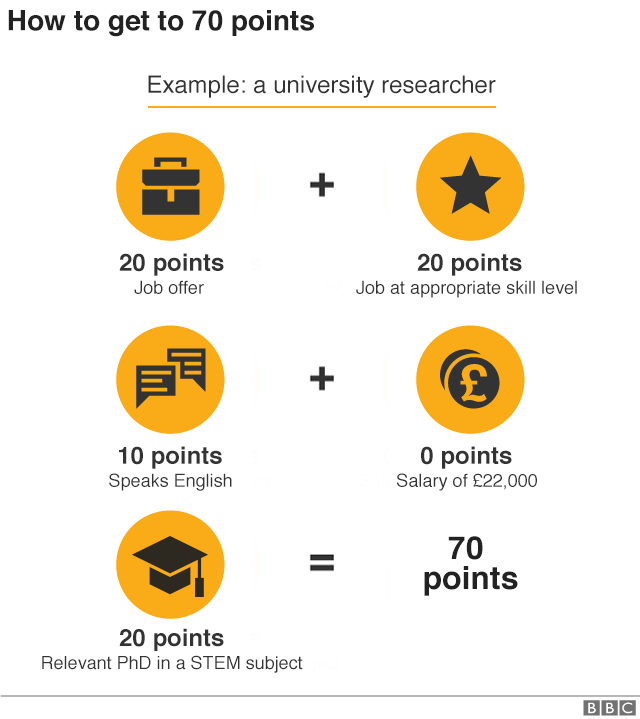
The process has not been all plain sailing. Leaving the EU single market is one of the factors that contributed to an HGV driver shortage, because EU drivers can no longer come and go as they please. The government had to introduce 5,000 temporary visas for this sector.
Pledge: No rise in rates of income tax, National Insurance or VAT
This manifesto pledge was broken.
In September 2021, the government announced that workers, the self-employed and employers would pay 1.25p more National Insurance (NI) in the pound from April 2022.
But, because of cost of living pressures, the government later reduced the impact of this by announcing that from 6 July 2022 the point at which employees would start paying NI would increase to £12,570.
This means that in the 12 months from April 2022, anyone earning less than about £34,000 will pay less NI than they did last year. Anybody earning more than that will pay more.
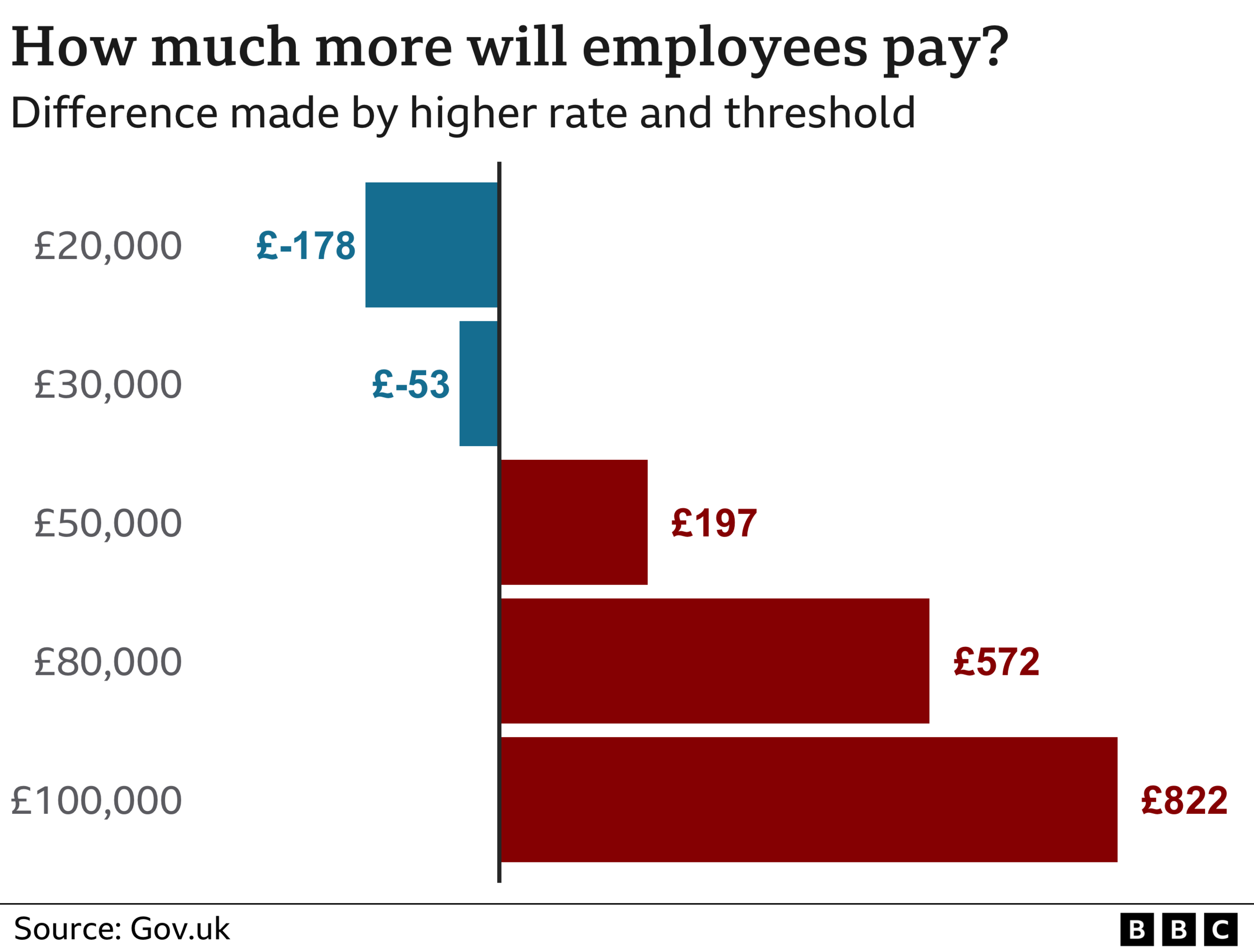
Pledge: Fix the crisis in social care
The government says the money from the NI rise will go initially towards easing pressure on the NHS.
A proportion will then be moved into the social care system - which Mr Johnson pledged, in 2019, to "fix".
In 2021, the government unveiled its plan to cap the costs that people in England pay for social care. From October 2023, this will be set at a maximum of £86,000 for care during their lifetime.
But the long-awaited reform of funding does not fix other problems such as the shortage of care workers. Research in May 2022 estimated that 500,000 adults in England were waiting for social care, up from 294,000 a year ago.
Pledge: Keep the triple lock
The triple lock means the state pension increases each year at whichever of these is highest:
CPI inflation (the rate at which prices are rising as measured by the Consumer Prices Index)
average wages
or 2.5%
The 2019 Conservative manifesto said it would stay for the duration of this Parliament.
But this promise was broken on 7 September 2021 when the government announced it was suspending the triple lock for a year and blamed the pandemic.
The government says it will return in April 2023.
Pledge: Spend 0.7% of GNI on international aid
This manifesto pledge has also been broken.
The UK's annual aid budget has been reduced to 0.5%, external of GNI (gross national income) - a cut of about £4bn.

Again, the government blamed the pandemic - saying cutting aid spending would help restore the public finances.
It said the 2015 legislation, which introduced the 0.7% target, referred to "fiscal circumstances" which governments may refer to, if they fail to meet it.
Pledge: Full fibre broadband to every UK home by 2025
This 2019 manifesto pledge was scaled back the following year.
In a policy paper, external released by HM Treasury in November 2020, the target had changed to "a minimum of 85% gigabit capable coverage by 2025".
There has been considerable progress though. Gigabit coverage has gone from 10% to 70% since July 2019, according to government figures.
Covid
As well as pledges, Boris Johnson has made claims about his government's record during the pandemic.
Claim: Fastest vaccine roll-out in Europe
The UK was the first country to approve a Covid vaccine - on 2 December 2020. Its vaccine rollout began on 8 December 2020 - weeks before the EU's.
The UK vaccine programme was the fastest in Europe until May 2021.
After that, EU countries caught up, if you look at doses per 100 people in a country's population.
Claim: Fastest growth in the G7
The prime minister has repeatedly talked about the UK having the fastest-growing economy in the G7, which is a club of major, developed economies.
Whether this is true depends on which period, external you are looking at.
For the whole of 2020, the UK economy contracted by 9.3%, which was the biggest decline in GDP in the G7
For the whole of 2021, it grew by 7.4%, which was the biggest growth in the G7
The IMF predicts, external that in 2022 the UK will have 3.7% growth, the joint second highest in the G7 (behind Canada)
The OECD, external forecasts that the UK will have zero growth in 2023, and will be the slowest growing economy in the G7
If you look at growth since before the pandemic, the UK is in third place in the G7 with 0.7% growth
Update: This piece was first published on 4 October 2021 and has been updated several times since then to add pledges and update figures.
